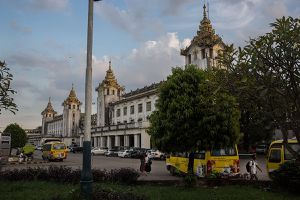Ábbad

| |
| Photo of the Hall of the Nadcraši | |
| Nation: | |
| Population (November 2018): | 1,572,985 |
| Predominant language: | Palesmenian, English |
Ábbad is the capital and second largest city and capital within the nation of Palesmenia. The city has a rich history, being the capital of two nations that fell long before Palesmenia's creation.
History
The city was formerly the site of the capitals of Kampong (Chinang) and The Kingdom of Uantir (Castle Uantir). After the collapse of Uantir and the reduction of Juclandia's borders, the Palesmenian people stumbled upon the ruins of Castle Uantir. Most of what was Chinang was gone, save for the portions of the sewer pipes having Kampongese company names on them. It had appeared that the city was already looted, as many shops and houses where burned and had their windows smashed in. This, however, didn't stop Nasser I, future emperor of Palesmenia, from choosing the ruins as his seat of power. It was said he chose it for its highly defensible position and it's "nice seaside view". Ábbad's name is hard to trace back. The Láu people, a clan rivaling those of Nasser's , named the city "Anbárdiy", which literally meant "Sea Rock". Most people would tell you that people just began calling it "Ábbad" and the name stuck. After the unification of Palesmenia, it remained the capital and the seat of the nation's government, the Nadcraši. During the 1684 coup, the city saw heavy fighting, as republican and militarist militias sought control over the Federal District (which also held several other key cities). The fighting in the city caused heavy damage to infrastructure and structural components of the city, and caused many civilian deaths. However, after the coup ended, most of the damage was quickly repaired.
Ábbad Today
Today the city is a booming center of art, culture, and music. The city is also regarded as the financial capital of the country. However, ghettos aren't uncommon within the western part of the cities due to the lack of funding of these areas. Regardless, many people have began to move to the city for better opportunities and jobs.
Administration
The city is home to 6 municipalities, 3 of which are urban, 3 of which are suburban.
| Municipality | Classification |
|---|---|
| Akhír | Urban |
| Aferistás | Suburban |
| Báhnkar | Suburban |
| Defherán | Urban |
| Níjkodah | Urban |
| Gúija | Suburban |
Attractions
- The 5 Beaches
Visit the 5 wonderful beaches of this wonderful city! Just don't get to drunk.
- The Old City
Go to the old city to see classical architecture of all sorts. You are advised not to touch anything fragile.
- Halls of the Nadcraši
Where the laws pass and old men yell at each other for a living. Tours are open on weekends, and most times when Nadcraši is not in session.
Safety Tips
These safety tips are presented by the Ministry of Public Safety.
- Do not go into the Western City unless traveling to another location outside of the city
- Do not give any street beggars money or food, direct them to the nearest homeless shelter.
- DO NOT, UNDER ANY CIRCUMSTANCES join an underground resistance group, unless you want to be executed.
- Don't go into government property unless a designated tour guide (check the badge) directs you to.
- If anyone tries to get you into a conversation about a foreign invasion of city, kindly tell them to leave as the navy patrols the waters nearby. It's not like any sane military would try to waste it's time invading us!
- If you wish to leave the city, do so on National Highway 1, every main street has directions to it.
- The city is very friendly towards foreign languages. Most people speak Palesmenian and English. Some even speak French, Yiddish, Krasnocorian, Slavonjan, and Blepian!